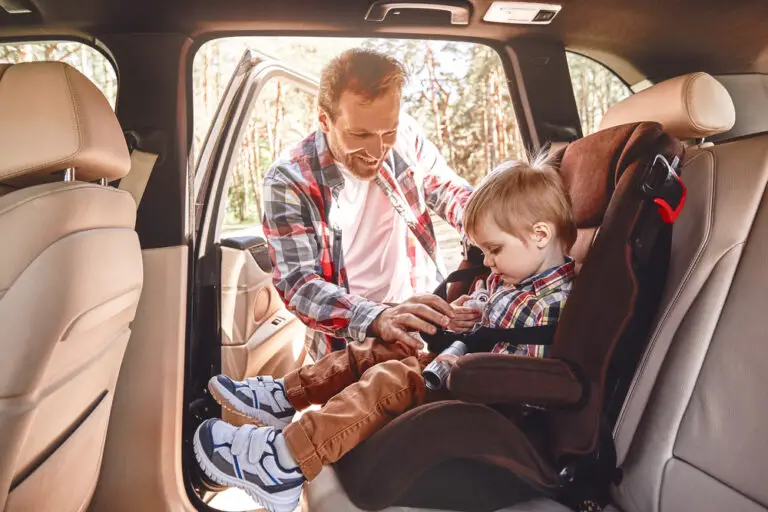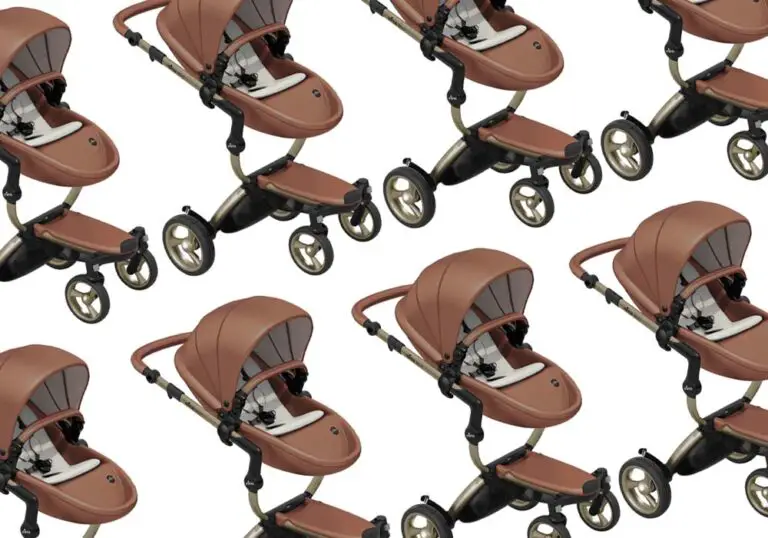Illinois Car Seat Laws 2024 (Rear, Forward & Booster)

Under Illinois car seat laws, all children under the age of 8 years have to be secured in an appropriate child restraint system.
The penalty for violating the law ranges from $75 for a first offense to $200 for a second and subsequent offense. Those children who are physically unable to use a child restraint or seat belt are exempt.
Disclaimer: This content does not constitute legal advice. It is solely for informational purposes. Always check the original source of the law for the latest version.
- Rear-Facing
- Forward-Facing
- Booster
- Front Seat
- Seat Belt
- Taxi Seat
- Ridesharing Seat
- Replacement
- Alone in Car
- Choosing a Seat
- Installation Help
Illinois Car Seat Laws
Illinois Rear-Facing Car Seat Law
According to the rear-facing car seat law in Illinois, a child under the age of 2 years who is shorter than 40 inches or lighter than 40 pounds must be secured in a rear-facing seat. (1)
Though the rear-facing car seat age in Illinois is newborn to 2 years, you should keep your infant in their rear-facing seat till they reach its maximum weight or height limit set by the manufacturer.
Violating Illinois rear-facing child seat law is a petty offense. The first violation carries a fine of $75. The person will not be charged if they can show the court that they have acquired a car seat and completed an instructional course on car seat installation. A second or subsequent violation will result in a fine of $200. This will not be waived.
Age: Newborn to 2 years
Height: 40” or taller
Weight: 40 or more pounds
Penalty: $75 for a first-time, $200 for a second and subsequent offense.
Illinois Forward-Facing Car Seat Law
There is no definite forward-facing car seat law in Illinois. According to the car seat laws in Illinois, children younger than 8 years must be placed in a car seat unless they have a physical disability. (1) The restraint should be appropriate for their height and weight.
In the absence of an Illinois forward-facing child seat law, you can refer to the guidelines of the American Academy of Pediatrics (AAP). It recommends keeping children in a forward-facing seat with a harness till they reach its maximum limits. So even though the forward-facing car seat age in Illinois is absent, it is best to follow the recommendations of the AAP.
The parent or legal guardian is responsible for providing a car seat. A first violation of the law carries a penalty of $75. A second and subsequent offense carries a fine of $200.
Age: Less than 8 years
Penalty: $75 for the first-time, $200 for a second subsequent offense.
Illinois Booster Seat Law
There is no particular child booster seat law in Illinois However, Illinois state law requires all children under 8 years old to ride in an appropriate child restraint. (1)
If your child has outgrown the height or weight limits of their forward-facing seat, they should shift to a booster seat. Depending on your requirements, you can choose a high back or backless booster seat
The booster seat age in Illinois is not mentioned. But you should keep your child in a booster till they are big enough to wear the seat belt.
Illinois booster seat requirements do not apply to a child who has a physical disability that is certified by a licensed physician. Failure to otherwise use a booster seat will result in a fine of $75 for the first offense and $200 for a second and subsequent violation.
Age: Under 8 years
Penalty: $75 for a first offense, $200 for a second subsequent offense.
Illinois Child Front Seat Law
There is no definite child front seat law in Illinois. However, the (AAP) recommends keeping children younger than 13 years in the backseat as it is the safest option for them.
If you are carrying your child in the front seat, you must secure them in a child restraint that is appropriate for their height and weight requirements. Additionally, airbags can be harmful to children. If you have to put a rear-facing seat in the front seat, the front passenger-side airbag must be deactivated. In all cases, the vehicle seat must be pushed as far away from the dashboard as possible.
Even though the front seat age in Illinois is not mentioned, it is best to follow the best practices recommended by the AAP.
Age: 13 years (recommended)
Illinois Child Seat Belt Law
According to the child seat belt law in Illinois, a child older than 8 years but younger than 16 years has to wear an adult safety belt. (1) It must fit snugly across their lap and shoulders. They have to follow these requirements whether they are in the backseat or the front seat.
Seat belt rules in Illinois do not apply to children who cannot wear a seat belt due to a physical condition that is duly certified by a physician.
Violating Illinois children’s seat belt law is a petty offense. The first violation entails a fine of $75. A second and subsequent violation carries a penalty of $200. The person transporting the child will be held liable if the child is not wearing a seat belt.
Age: 8 to 16 years
Penalty: $75 for a first-time, $200 for a second subsequent offense.
Illinois Taxi Child Seat Law
According to the taxi child seat law in Illinois, taxis are required to have a child passenger safety system in place. There is no exemption for them.
Illinois child seat laws require all children under the age of 8 years to be secured in a car seat. (1) The parents or legal guardian of the child have to provide a taxi child seat in Illinois to the person transporting them.
Thus, it is your responsibility to arrange an appropriate car seat before traveling with your child in a taxi. If your child is under 2 years old, they must be secured in a rear-facing car seat. For children above 2 to 8 years old, it can be a forward-facing or booster seat depending on their height and weight.
Illinois Ridesharing Child Seat Law
There is no clear ridesharing child seat law in Illinois.
Under the child seat requirements in Illinois, all children under the age of 8 years have to be secured in an appropriate car seat or the seat belt. (1) Only those who are physically unable to use a car seat due to medical reasons are exempt.
The law does not specify if it applies to ridesharing services such as Uber or Lyft. However, it clearly places the responsibility of providing a child seat on the child’s parent or the legal guardian. The person transporting the child has to ensure that they are properly secured.
Thus, you have to provide a car seat when traveling with your child in a ridesharing service. For children between 8 to 16 years old, you have to ensure that they wear a seatbelt.
Illinois Child Seat Replacement Law
There is no definite child seat replacement law in Illinois. However, you must replace your child safety seat if it is involved in an accident or has expired.
The National Highway Traffic Safety Administration (NHTSA) recommends child seat replacement after an accident, especially after a moderate or severe crash. In case of a low impact accident, there is no urgent need to replace the car seat. A low impact crash is where no passenger is injured, the door nearest to the car seat is not damaged and the seat itself shows no visible damage.
Apart from replacing the seat after an accident in Illinois, you must also replace it after it has expired or has been recalled. Check the manufacturer’s website or car seat sticker for more information.
Leaving Child in The Car in Illinois
According to the law on leaving a child in a vehicle in Illinois, it is illegal to leave a child 6 years old or younger unattended in a motor vehicle for more than 10 minutes. (2) They should be accompanied by a person 14 years of age or older.
The most common danger of leaving a child unattended in a vehicle is heat stroke. The temperature inside the vehicle can rise rapidly. Since children’s bodies heat up faster than adults, they are at great risk of suffering a heat stroke.
Leaving a child in the car in Illinois is a class A misdemeanor. A second or subsequent violation is a class 3 felony. If the child dies because of being left unattended in the car, the offender can be imprisoned for a term of 2 to 10 years. If the parent violates this provision, they may be sentenced to probation.
Choosing a Child Car Seat in Illinois
When choosing a car seat in Illinois, you must ensure that you adhere to the relevant Illinois car seat regulations. To find the best child seat, you can refer to the NHTSA recommendations.
From the time your child is born till they turn at least 2 years old, an infant rear-facing car seat is the best car seat to use in Illinois. They can then move to a forward-facing seat with a harness and tether. After they outgrow these, they should use booster seats. A seat that lifts your child up and allows the seat belt to fit perfectly across their lap and shoulders is the best booster seat to use in Illinois.
Car Seat Installation Help in Illinois
Many parents are unable to correctly install their car seats. You have to follow the manufacturer’s instructions as well as refer to your vehicle’s manual. All this can seem complicated and you may not always succeed in installing the car seat correctly.
To help you with installing child passenger safety seats in Illinois, there are different stations with certified Child Passenger Safety (CPS) technicians. They also provide you with vital tips on car seat safety. Some of these stations are:
- East Peoria Fire Department
- Lombard Police Department
- Wheeling Police Department
- The University of Illinois at Chicago Police Department
- Deerfield Police Department
Illinois Car Seat Safety Resources
- Buckle Up Illinois: It is a program by the Illinois Department of Transportation’s Bureau of Safety Programs and Engineering (BSPE) and contains a library of resources on child passenger safety. It has information about the law, selection of car seats and a list of inspection stations.
- Illinois State Police: It explains the Child Passenger Protection Act in a simple manner and also has information on seat belts.
- Lombard Police: The department’s official website explains the law and also lists the guidelines for using car seats for different age groups. It also has general child passenger safety tips for you to follow.
FAQ
How long should a child ride in a rear-facing car seat in Illinois?
A child should ride in a rear-facing car seat till the age of 2 years. They should continue in a rear-facing seat till they exceed its maximum limits.
Can you put a rear-facing car seat in the front seat in Illinois?
The law does not prohibit it but a rear-facing seat should be placed at the back. If you do put it in front, the front passenger-side airbag must be deactivated.
Can you put a rear-facing car seat in the middle rear seat in Illinois?
You can put a rear-facing car seat in the middle rear seat but it must fit properly. Check the car seat as well as your vehicle’s manuals.
When can a baby face forward in a car seat in Illinois?
A child can face forward after they turn 2 years old or outgrow the maximum height or weight limits of their rear-facing seat as set by the manufacturer.
How old for a booster seat in Illinois?
There is no specific age under the law. However, children should ride in a booster seat once they outgrow the height and weight limits of their forward-facing seat.
When to use a backless booster seat in Illinois?
You can use a backless booster seat if your vehicle seat has a headrest and the child’s ears are not higher than the seat back.
When can a child sit in the front seat with a booster in Illinois?
Ideally, children under the age of 13 years should ride in the backseat. But they can ride in the front seat with a booster with the vehicle seat pushed away from the dashboard.
When can a child stop using a booster seat in Illinois?
The law does not mention a definite age. But a child can stop using a booster seat when the seat belt fits them properly (usually when they are 4’9” tall).
When can a child sit in the front seat in Illinois?
Illinois law does not say anything regarding this. But the AAP recommends that a child sit in the front seat after they turn 13 years old.
When to switch from 5 point harness to a seat belt in Illinois?
When the child outgrows the height and weight limits of the 5-point harness, they can switch to wearing a seat belt in a booster seat.
When can a child use a regular seat belt in Illinois?
Under the law, children from 8 to 16 years old have to wear regular seat belt. But they should ideally move to a seatbelt once they have outgrown their booster seat.
Do you need a car seat in a taxi in Illinois?
Taxis are not required to have a car seat. However, parents or legal guardians have to provide a car seat to the person transporting their child.
Do you need a car seat in a Uber in Illinois?
The law is silent on this issue. But parents or the legal guardian have to provide a federally approved and appropriate car seat to the person transporting their child.
Do you need a car seat in a Lyft in Illinois?
It is not clear if the law applies to Lyft. But the child’s parent or legal guardian has to provide a federally approved and appropriate car seat when transporting the child.

Rishima Rawat
Rishima Rawat is a lawyer and legal writer with over six years of writing and legal experience. She earned her LLB degree from the West Bengal National University of Juridical Sciences, Kolkata. With a passion for child safety, she’s written extensively about the U.S. car seat laws in ParentingMode. She collaborates with businesses and law firms globally, enhancing their online content. Her insights are also published in legal journals like RGNUL, NLIU, and RMLNLU Law Review. Committed to the cause of education, she has volunteered with IDIA, which helps underprivileged children in India to access legal education. She has also worked with Enhelion Knowledge Ventures, a leading legal ed-tech platform in India that provides students with affordable courses in law. Fluent in English and Hindi with elementary proficiency in Spanish, Rishima combines her legal expertise with a dedication to child safety.






